I had a good time sitting down to an interview at GotBooks. We talked quite a bit about my novel FORGIVE ME, ALEX, and I hope you like it.
I’m so pleased to have had in hand, as editor, in the publishing of over 190 books (the 200 benchmark is so close, I can taste it). Now, many of these books are coming out as audiobooks, which I know a readers – err… listeners – prefer. I would be remiss if I didn’t mention some that I’ve worked on, and that I absolutely loved, as a reader.
I’ll include the Spotify link & image for each of them, but I’ll also list the Universal Book Links so you can find all formats and major sites for each of them.
Enjoy!
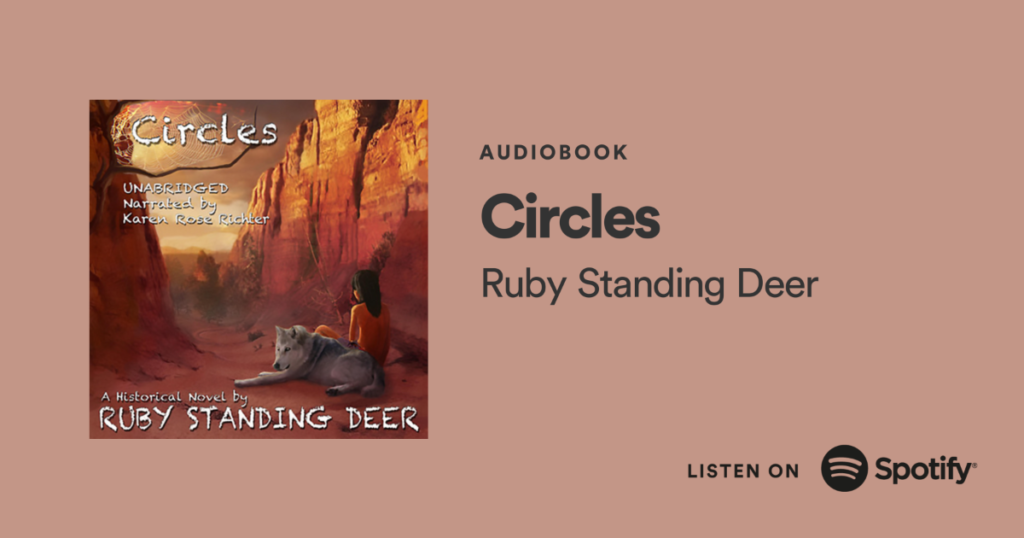
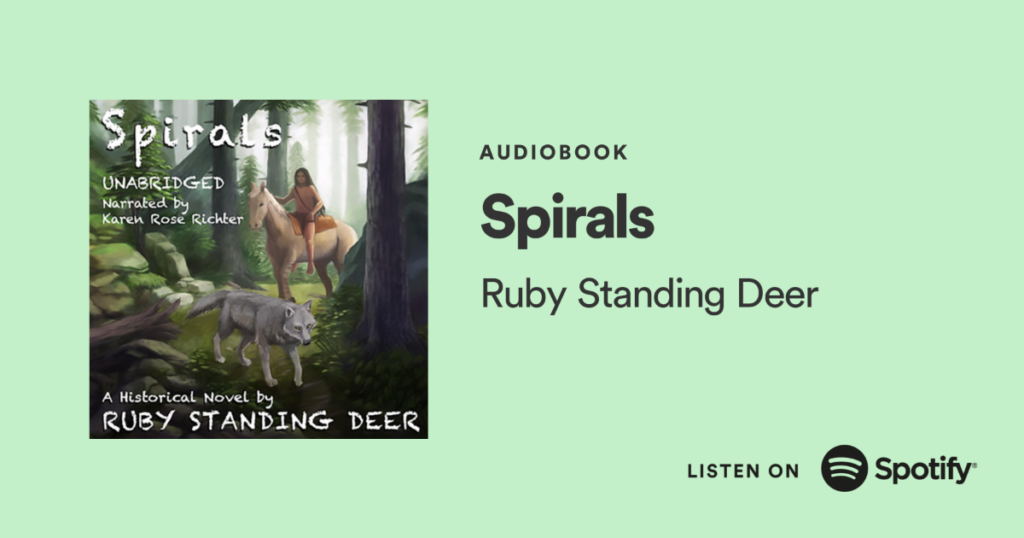
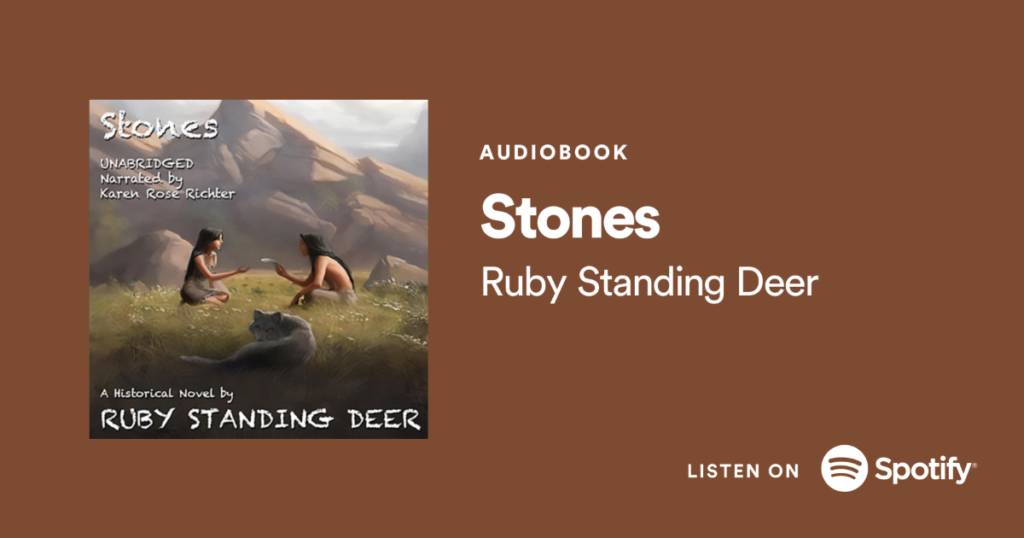
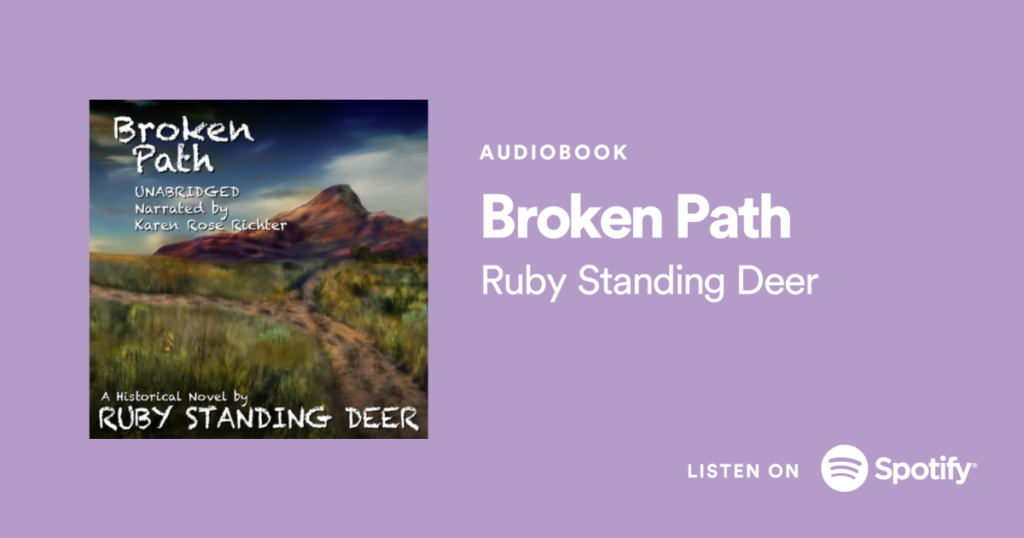
The “Shining Light’s Saga” Series by Ruby Standing Deer
Narrated by Karen Rose Richter
4 Books: Native American Indian, Historical Fiction
Spotify 1: https://EvolvedPub.com/CirclesAudioSP
Spotify 2: https://EvolvedPub.com/SpiralsAudioSP
Spotify 3: https://EvolvedPub.com/StonesAudioSP
Spotify 4: https://EvolvedPub.com/BrokenPathAudioSP
UBL 1: https://books2read.com/RSD-SLS-1
UBL 2: https://books2read.com/RSD-SLS-2
UBL 3: https://books2read.com/RSD-SLS-3
UBL 4: https://books2read.com/RSD-SLS-4
~~~~~~~~~~~~~~~
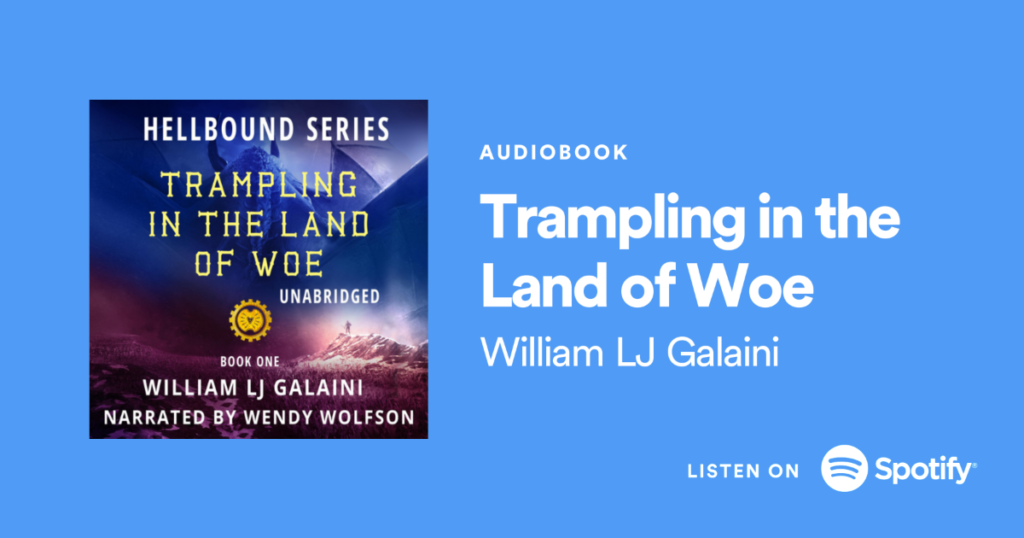
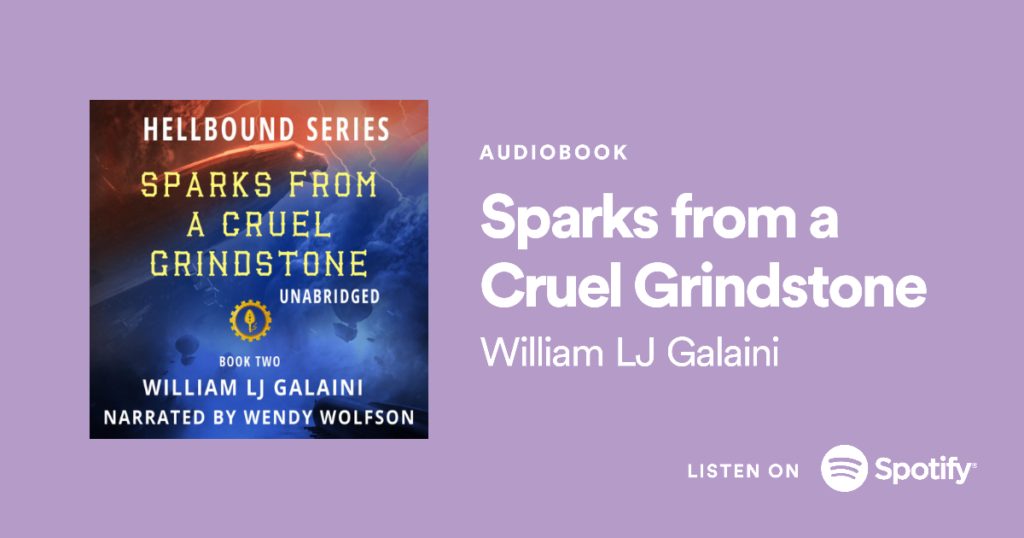
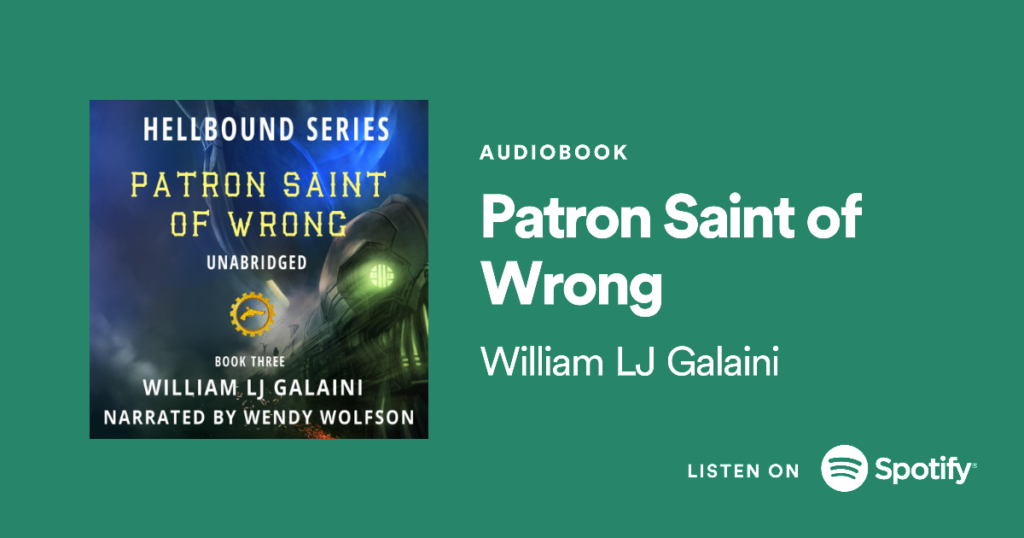
The “Hellbound” Series by William LJ Galaini
Narrated by Wendy Wolfson
3 Books (Soon to be 5): Religious Fantasy, Steampunk, Metaphysical
Spotify 1: https://EvolvedPub.com/HB-TITLOW-Audio-SP
Spotify 2: https://EvolvedPub.com/HB-SFACG-Audio-SP
Spotify 3: https://EvolvedPub.com/HB-PSOW-Audio-SP
UBL 1: https://books2read.com/WLJG-HB-01
UBL 2: https://books2read.com/WLJG-HB-02
UBL 3: https://books2read.com/WLJG-HB-03
~~~~~~~~~~~~~~~
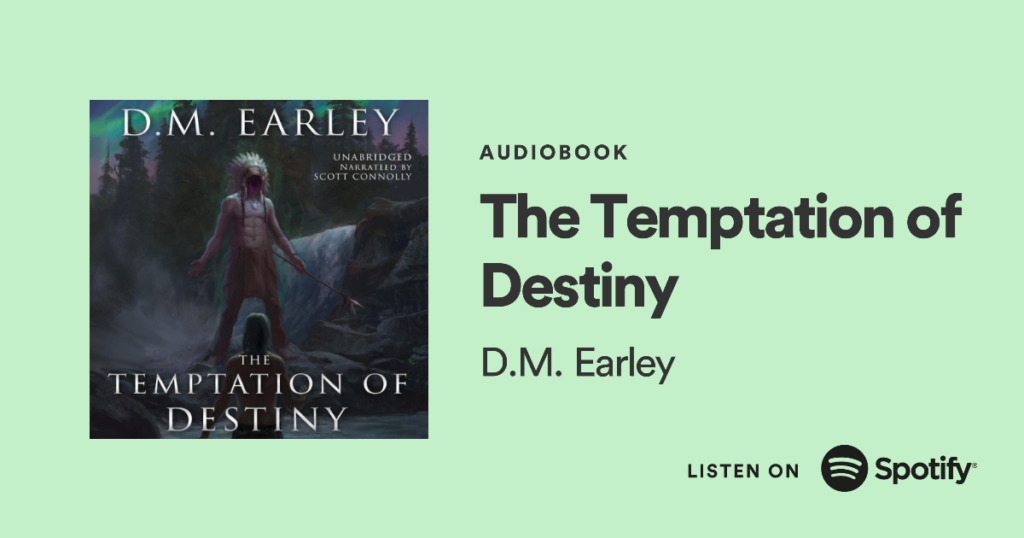
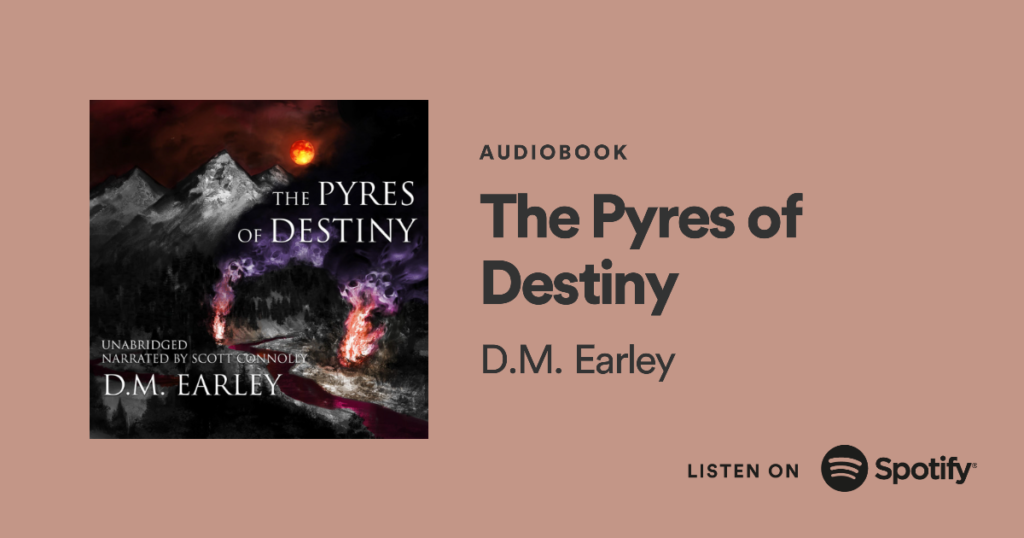
The “Call of Destiny” Series by D.M. Earley
Narrated by Scott Connolly
2 Books (Soon to be 3): Supernatural Thriller, Horror, Native American Indian
Spotify 1: https://evolvedpub.com/TTOD-Audio-SP
Spotify 2: https://evolvedpub.com/TPOD-Audio-SP
UBL 1: https://books2read.com/DME-COD-01
UBL 2: https://books2read.com/DME-COD-02
~~~~~~~~~~~~~~~
Well, that’s some great listening to get you started. I’ll be back with more great audiobooks in future posts.
As a reader, I’ve always been drawn to authors who take the time to really WRITE for me, going the extra mile and giving me prose that occasionally makes me say, “Wow! I wish I’d written that.”
As an author, I try to provide precisely that kind of moment for my readers, at least once in a while. Have I succeeded? I guess you’d have to ask my readers.
Still, I’ve picked out a few segments of my book, FORGIVE ME, ALEX, which I’ve always been pleased with, where I tried to go that extra mile. I’m not going to pinpoint them in the book for you, or give away any spoilers, in case you want to read the book, but here are a few paragraphs I really enjoyed writing (meaning agonizing over, sweating, rewriting, sweating some more, and rewriting again… and again). I hope you like them.
~~~~~~~~~~~~~~~~~~~~
Alex’s vacant brown eyes and perpetual frown, his continuous soft sigh and the musty smell of sweat and tears on his Scooby-Doo pajamas, the way his chin rested continually on his chest—these left me utterly heartbroken.
~~~~~
Like whispers in a storm, those memories only tease at me now, here at this obscene and maddening event. I’m trying not to relive every moment of 1978. Every time I do, I feel as if swimming in quicksand, anchored by my constant companions—sorrow and guilt. I’m too damned tired; can’t shake the confusion, the dread. I fear surrendering to fear.
My life teems with just such wretched ironies.
~~~~~
Finally, dawn crept mischievously out of the darkness, like the bratty kid down the block come to tease me.
~~~~~
The words I wrote in my diary at the time return to me, a personal anthem more relevant than ever: Rage flows like lava through my veins. My soul slowly roasts upon the flames. How did I ever let it come to this?
Now mortality, as it did seventeen years ago, lingers above me like the hangman’s noose. Yet it looms more ominous than ever, as if it will drop down around my neck at any moment. After all, I know the true Mitchell Norton. And whom shall I fear if not the devil, the grim torturer who conquered my aspirations and left me without a recognizable world of my own?
~~~~~
Long before the embers of the dawn burn, I awake to a world cloaked in darkness, mired in a storm that mirrors my essence. My dream of Alex, reduced to a puff of smoke in a gale-force wind, still cuts me to the bone. I struggle to regain my composure, but my emotions remain on edge, as though the smallest catalyst will tumble me into the abyss, the black chasm of my mind.
I’ve long stood upon the precipice, waiting—almost hoping—for the ledge to collapse beneath me.
~~~~~
Circumstances change, roads turn, and life occasionally heads off down its own path, like the impetuous child who turns and says, “Come on, hurry up!” That’s how I feel, as if chasing after my own life, unsure where it’s going but cautiously hopeful. Contentment remains hidden—my elusive desire. In my entire adult life, I’ve been unable to cast it from the shadows. It’s there, I know—waiting, perfectly camouflaged in the vagaries and machinations of everyday life. I have merely to reach out and grasp it.
~~~~~
When the voice of the Reaper comes to call, you’d better put on your listening cap. He’s quite the work, the Reaper, dedicated to everlasting misery, the exploitation of flesh, the ecstasy of terror. If the deepest, darkest and most horrifying recesses of the human mind can conceive of it, then the Reaper has already heaped it upon the dredges of humankind, already made of it a plaything, already rollicked in the pure joy of it.
~~~~~~~~~~~~~~~~~~~~
I hope you enjoyed those.
Sure… great fun… like gangrene. Pandemic, more pandemic, even more pandemic, and then such good financial times… and by good, of course, I mean ridiculously horrendous. And now come all the after-effects of 5 billion people getting poisonous jabs.
And yet, what is one to do but simply plug away and hope the sunshine breaks through the clouds sooner rather than later? I am ever the optimist, which is why I just assumed my wife quit smoking cigarettes when I started finding cigar butts lying around the house. (My wife is gonna kill me for that joke.)
I’ve been woefully absent from my own website the last couple of years, but I’m actually planning on posting one blog a month moving forward – no more of this once-a-year nonsense. So what should we talk about, in this crazy book business, at a time when no one seems to be buying books? Aye, there’s the rub.
The answer is to do what we do. I still edit, and publish, and someday, I might even write some of my own stuff again. Someday, when I have time, like maybe in 2073. In the meantime, my fellow authors at Evolved Publishing have been putting out some great books that are getting awesome reviews, winning hard-fought awards, and deserving of a much greater audience. Maybe, together, we can help. I hope so.
I’ve been editing a bunch of those, and have also taken on a couple of side projects worth noting, so I’ll be talking about some of those in the coming months. For starters, I’d like to present a series about which I’m really excited: “Uncommon Bonds” by William E. Noland.
The first book, Playing with Fire, has already been recognized with a couple of nice awards:
- FINALIST: Independent Author Network – Book of the Year 2022 –
FICTION: PARANORMAL/SUPERNATURAL - WINNER: Pinnacle Book Achievement Award, Fall 2022 –
BEST SUPERNATURAL THRILLER
Additionally, it has 3 separate 5-star reviews from the folks at Readers’ Favorite Book Reviews, and at Amazon, all 13 current reviews are 5-star affairs. Yep, folks are loving it. That includes me. As I was editing, I became a real fan, hooked on the two primary characters. You’re gonna love it too.
Now the second book, Hammer to Fall, is available, and I have no doubt it will be as well-received as the first book. In April, the third book, From the Beginning (that link will be live soon, if it isn’t already), is coming, so this is a prefect time to jump into this series.
Whether you’re a fan of suspense thrillers, speculative fiction, horror, or urban fantasy, this fantastic genre crossover series is one you’re going to really enjoy, so check it out… and thank you for your support.
2020, 2021, and…?
It’s fair for all of us, at this point, to ask if this madness overtaking the world is EVER going to end. I see signs that people are finally fighting back and seeking to regain control of their lives, and this encourages me. However, I know it will be no easy thing, and so, some level of frustration and uncertainty remain.
And yet….
Life does, indeed, go on. It must. So let’s get back at it, shall we?
On the writing front, I have no real news to report, sadly. It’s just so hard for me to find time right now, but that too will change at some point, probably not until early 2022. Then I plan to dive headlong into finishing THE DEVIL’S BANE, Book 2 of my “Tony Hooper” series of suspense thrillers.
On the publishing (Evolved Publishing) and editing front, I’m still busier than a 1-legged mule in an ass-kicking contest, but hey… that’s the gig, so no complaints. I’ve been really pleased to help bring to market some great books in 2021. Here’s a list (in chronological order):
- February: Murder by Valentine Candy by Gregg Sapp
- April: Blood or Loyalty by Adam Miller
- April: Children of the Volcano by Parris Sheets
- April: Lemuria by Burt Clinchandhill
- April: Negative Space by Mike Robinson (I also edited this.)
- April: The Tormenting Beauty of Empathy by Richard Robbins (I also edited this.)
- April: Trampling in the Land of Woe by William LJ Galaini (I also edited this.)
- May: The Clovis Dig by Teri Fink
- May: Sparks from a Cruel Grindstone by William LJ Galaini (I also edited this.)
- May: Waking Gods by Mike Robinson (I also edited this.)
- June: Patron Saint of Wrong by William LJ Galaini (I also edited this.)
- July: Judith’s Fall by D.W. Hitz
- August: Wiser by Isu Yin & Fae Yang (I also edited this.)
- September: A Debt of War by Michael Ringering
- September: A Face on a Train by Michael Ringering
- September: Foreign Land by J.S. Sherwood
- October: Sargon the Third by Scott Shinberg
- Late October to December: (Many More Coming….)
At the moment, I’m editing 9 books. Yeah… 9. I know what you’re thinking: What do you do with all your free time? Well, I like music and long walks on the beach and… uh… never mind.
I’m also doing all that I do as a publisher for Evolved Publishing (EP), which includes a lot of discussion about marketing these days. Have I mentioned that the last two years have been a bit challenging?
Thank God for cognac. And whiskey. And rum. No, no… really, as a rule I don’t drink. Well, as a habit I do, but as a rule….
Anyway, life does go on. I hope you’ll check out some of those books. They’re really great work, as is always the case from EP. Take good care of you and yours, and be well. God bless.
This Post is for Everyone:
What a horrendous year!
So yeah, 2020… the year that keeps on giving. Thus far, 2021 is not looking much better, and in some cases worse. Gah! Whatever. Life goes on, so….
On the publishing, editing, and writing front, things are moving ahead slowly but surely. In my role as publisher and managing editor at Evolved Publishing (and personal editor for several authors), I’ve been busier than a 1-legged mule in an ass-kicking contest. Indeed, I’ve struggled to get caught up, but am determined to do so before… oh… 2029.
On the writing front… sigh. Not much to report there. No time. Maybe another day, or week, or month, or….
On the newsletter front, now that I have some actual subscribers (Hey, welcome to all my new subscribers!), I’ll be firing off a couple of newsletters: 1) For readers, this will come shortly, and will focus on a couple of nice opportunities; 2) For writers, I expect to have something out by the end of March — it’s a critical subject that I’m passionate about, and one that will help you greatly (he says modestly).
In the meantime, need a little listening entertainment? Hey, check out this page (he says modestly): https://www.lanediamond.com/music/.
This Post is for Readers:
If you love books that offer fun stories and memorable characters, but also great insights into the human condition, David Litwack is the author for you.
I’ve had the great pleasure not only to edit and publish David’s books, but hey… I got to read them! I’ve really enjoyed his books. I have a personal favorite, but as is always the case with these, they’re… well, personal. However, I have truly, truly enjoyed all 6 of his books to date. You will too.
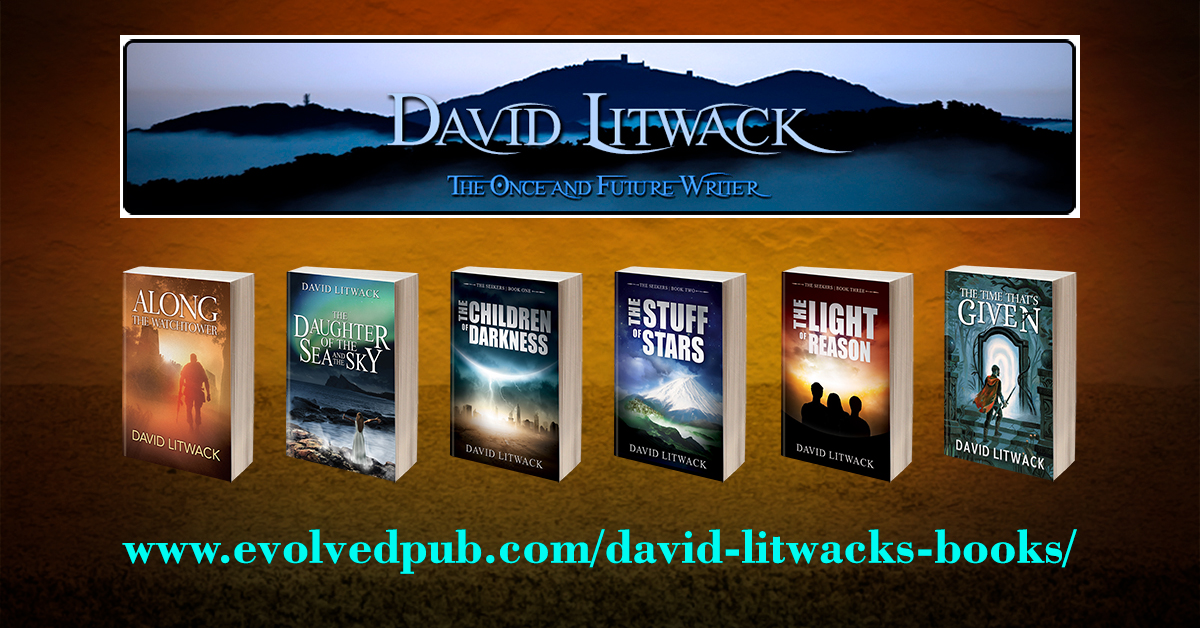
Allow me to list them in alphabetical order, with links (on the title) to the book listing at Evolved Publishing, where you can find links for all the major retailers.
A tragic warrior lost in two worlds… Which one will he choose?
I think the review below says it well about this multiple award winner:
Awesome Indies Reviews says, “The book not only helps us to understand the trials of a severely injured returned serviceman, but also highlights the archetypal nature of computer games and the healing power of using such imagery to defeat our inner assassins. All up, this is a book that deserves to be read. It is both gritty reality and magical fantasy, and filled with both love and beauty, and ugliness and despair, but ultimately it is a story of healing, of burying the past, finding hope and taking control of the future.”
THE DAUGHTER OF THE SEA AND THE SKY
A thought-provoking look at the line between faith and fantasy, fanatics and followers, and religion and reason.
“There are only two ways to live your life. One is as though nothing is a miracle. The other is as though everything is a miracle.” ~ Albert Einstein
This book has won multiple awards, and garnered some exceptional reviews. There’s a reason. If you love literary fiction with a speculative, religious, and philosophical tilt, you’re going to love this one.
The Children of Darkness, The Stuff of Stars, The Light of Reason
A thousand years ago the Darkness came—a terrible time of violence, fear, and social collapse when technology ran rampant.
“But what are we without dreams?”
Each of the 3 books in this series is a multiple award winner in its own right, and the praise for this series is more than I can recap here. This has been a popular series over the years, and one that will give you many hours of great entertainment. Check it out today.
Have you ever awoken from a vivid dream and wondered which side of waking was real?
Kirkus Reviews calls it: “A keen and delightful multigenre tale about a hero grappling with two worlds.”
Feathered Quill Book Awards calls it: “…a delicious and thought-provoking book full of introspective questions and the choices one makes in the moment.”
“I consider The Time That’s Given one of the most inspiring fantasy novels I have ever read.” ~ Astrid Iustulin, Readers’ Favorite Book Reviews (5 STARS)
~~~~~~~~~~
Trust me when I say that if you haven’t yet discovered David Litwack, this is an author you want to have on your reading list. You will not regret it. In fact, if you buy one of his books, and you don’t like it, send me a note, and I’ll make it right for you in some way. That’s my personal guarantee. ~ Lane Diamond
THIS POST IS FOR WRITERS:
Yes, “The Golden Rule” Applies Here
So you’re an author who’s published a book (or two or ten)? Excellent. Congratulations! Now… how do you sell your book(s)? You do want readers, I know. We all do.
I don’t want this post to be a lengthy discussion of book marketing, which is a whole other monster that deserves more space and time than we have here. However… perhaps no group consists of more avid readers/book buyers than writers. For most of us, all of that reading is what drew us to writing in the first place.
I can’t even imagine how many books I’ve bought over the last 40+ years, but it is a BOAT LOAD! I have supported a great many writers, and I’m happy to do so, because they have provided me with endless hours of entertainment, or given me critical information, or helped me learn, or motivated and inspired me, or…. I read a lot of different subjects, fiction and non-fiction, so it’s a long list.
When it comes time to get your book out there, to generate reviews, to build visibility and rankings, don’t overlook other authors as possible resources to help you. Engage in a little, “You scratch my back and I’ll scratch yours.” HOWEVER….
Please be careful to safeguard your reputation and integrity. Don’t post false reviews. If you don’t like a book you read in one of these exchanges, be honest about it. You may choose not to post a review at all, but DO NOT post a positive review if that’s not really your opinion. Make sure all parties are in agreement on this point before you proceed.
Keep it honest, and it will benefit you in the long run. Shady shortcuts now might well derail your career in the future. Don’t go down that track. You owe it not only to yourself, but to your fans.
And so, as a matter of “putting my money where my mouth is,” I’ll agree to participate in such an exchange with you, IF you have a book out there that I might be interested in, and if I can get the eBook at Amazon for $6.99 or less. My own Kindle eBook for FORGIVE ME, ALEX is $4.99. Fair warning: I’m a really busy guy, so it might well take me a couple months to complete and post my review at Amazon. Also, if I have any kind of financial interest in your book, meaning I make money when your book sells, I will not be able to do this for you, as it’s a clear violation not only of retailer rules, but of general ethics.
Again… integrity and a strong reputation remain critical.
Anyway, I’d love to hear from you if you think we might be able to help each other.
THIS POST IS FOR WRITERS:
Prepare Well, and Elevate Your Prose
(This article originally appeared at another site back in March of 2011, from which it is now gone. Therefore, I re-post it here. NOTE: I may come back later [today is 25 September 2020] to update it, including how it applies to our standards at Evolved Publishing.)
I aim this post at aspiring authors who seek to publish, for the first time, via a traditional publisher.
I love to read fiction, and one of my greatest joys is the discovery of wonderful new authors. Yet they are not as plentiful as one might expect. If you’ve been trying to publish your first novel (and I don’t mean self-publish—anyone with a credit card can do that), you know precisely what I mean.
1) The traditional publishing industry is a notoriously difficult nut to crack.
2) Most agents require a referral, or preliminary contact at a writer’s conference, before they’ll take a hard look at a first-time author of fiction. Some agents express indignation at that statement but…come on…really? Who knew that just finding an agent who’ll read the manuscript would be such a daunting task—such a crazy concept? I didn’t…until I started the process. Yikes! Yet as broken as the industry is in this regard, first-time authors bear some of the blame—a great big chunk of it, in fact.
3) Most first-time authors are simply not ready for publication. Their work needs some…er…um…work. Most submissions that agents receive from first-timers are substandard. Agents, who are only human (Oh yes they are!), develop an auto-response psychologically: “Oh no! This submission is from a first-timer! Aaaaahhhhhh………” They must fight this tendency every day, I think. Some succeed—sometimes—and some don’t. The walls they erect against first-time authors of fiction are formidable, which makes our task of cracking that nut an insanely difficult one. Is anyone else losing his hair? Yeesh!
You must be a good storyteller, of course, but you must be more than that. You must be a WRITER. In other words, WHAT you write is important, but HOW WELL you write it is equally so.
4) Agents are unforgiving when it comes to the work of first-time authors. You can get away with much less than do established authors. Let’s face it: some poor writing makes it into print—but rarely from first-time authors of fiction. Do you think that’s unfair? You’d best get over it, and do what you must to break through those barriers. If you can’t accept that, please go back to your day job—save your sanity.
5) You must grab the agent on the very first page of the manuscript, preferably the first paragraph. In fact, why wait that long? Hook them with the FIRST SENTENCE! Front-load your piece; otherwise, they’ll never see all the brilliance that awaits them deeper into your manuscript. As a first-timer, and assuming you don’t have an “in” with the agent (referral, personal history, etc.), you have no reputation or track record to serve you. Therefore, grab them by the throat, right out of the chute, and don’t let go.
6) No spelling errors! No grammatical errors! Period! Do you want to be a professional? Outstanding! Then write professional prose. Oh sure, there are those moments when, for purely stylistic purposes, you violate the rules of grammar. Fine, but remember: you’re a first-time author. Agents will accept only so many of those “stylistic choices” before they determine that you simply don’t know how to write properly. Besides, if you minimize those stylistic flourishes, they’ll pack a much stronger punch (assuming you’ve executed them well); if you overload them, you’ll water them down, sap them of their effectiveness. Don’t be too cute by half, for the likely result may be the all too familiar: The agent stops reading your manuscript, perhaps with a frustrated sigh, and reaches for one of those wonderful little slips that start, “Thank you for allowing us to review your manuscript. Unfortunately…”
Good writing, even merely adequate writing, is an acquired skill. It requires rather a lot of work. Darn it! Yes, you must have some innate talent, but you must develop your natural skills to reach your full potential. You must work at it.
7) Read, read, and then read some more—fiction. If you write romance novels, for example, then read A LOT of romance novels. Know your genre. Know what passes as “publishable” material, but always keep in mind that the standards are higher for first-time authors.
8) Read, read, and then read some more—nonfiction. If you were going to be an electrician, you’d read books about electronics. If you were going to be an astronomer, you’d read books about astronomy. Need I say it? Well, all right: Read books about writing! There are some great ones out there. If you’re a first-timer, focus initially on those earmarked for beginners, and make sure that The Elements of Style, by William Strunk Jr. and E.B. White (Macmillan), is part of your arsenal.
9) Finally, if you’re serious about publishing your work, find an editor. Every beginning writer (and most established ones) needs an editor. We’re too close to our own work. We often make mistakes that belie our skill level, meaning we know better, but we may read right over those mistakes when self-editing. A writer’s mind puts up psychological barriers, as if it assumes that, if she wrote it in the first place, it must be right. Why else would she have written it? It’s rather as the old saw says: “Forest? What forest? I don’t see no stinkin’ forest. All those darned trees are in the way!”
When it comes to your fiction, think of your prose as the trees and your STORY as the forest. If an agent can’t see through the trees to find the forest, your STORY will wallow in perpetual anonymity.
‘Til next time, remember this: Writing well is not easy. It takes work. You mustn’t be lazy.
THIS POST IS FOR WRITERS:
Narrative: 1st-Person vs. 3rd-Person
(This article originally appeared at another site back in March of 2011, from which it is now gone. Therefore, I re-post it here.)
It’s time, you tell yourself, to finally sit down and write that novel or short story that’s been burning a swath through your consciousness. Outstanding! Now you must answer the first critical question: Who’s going to tell your story?
In other words, which narrative voice will you employ? You have options, but for our purposes, since a second-person narrative is so rare (and difficult to pull off), I’ll focus on the two primary options.
1) First-Person Narrator
a. This would be a character from your story, typically the protagonist.
b. You could have multiple first-person narrators, each telling their own parts of the story.
2) Third-Person Narrator
a. The most common form is the omniscient narrator—the God-like being that sees, hears and knows everything.
b. It could be a secondary, minor character, a witness to the critical story elements.
c. It could be a separate “interested party,” such as a news reporter.
Important Consideration
The truth is that most agents and editors (publishers) dislike a first-person narrative. Why is that the case? The simplest answer is this: Few writers pull it off well. Authors have so worn down agents and editors with poor first-person submissions, many of those agents and editors have erected an automatic mental barrier to them. Some are reluctant even to consider it seriously, let alone review the manuscript.
Don’t think badly of them. Under such a barrage of poor work, their reaction is perfectly natural. They’re only human, after all. (Oh yes they are!)
I’m not suggesting that you shouldn’t use a first-person narrative, merely that you have some hard work ahead of you.
We must overcome several challenges to create an effective first-person narrative. As the first-person narrator, we authors become the primary character; we personalize the narrative. That means we see everything through our eyes alone, which leads us into a few traps.
1) We don’t remain consistent with the character-narrator’s voice, in both the main narrative and that character’s dialogue. She must have one voice, whether narrating the story, speaking to another character, or musing in silent monologue.
2) We create a character-narrator with such quirks or limitations that they are no longer credible—believable—as narrator. If that happens, you’ve lost the reader.
3) We offer insights into what other characters are thinking or feeling, even though the narrator, as one of the characters, can’t possibly know what’s in the minds of those other characters. When we insist on a first-person narrative, we trap ourselves into a single Point-of-View (POV), and we must adhere to it.
a. You can get around this by having multiple first-person narrators, each telling their own part of the story. However, this is highly inadvisable in a short story, and in a novel, you must always break chapters when you change narrators. Furthermore:
i. It would be advisable to include in your chapter headings the name of the narrator for that chapter, in order to prevent reader confusion.
ii. You must establish a unique narrative voice, a distinctive style, for every one of your first-person narrators (no simple task), and that distinctiveness must shine through consistently in both their narrative and their dialogue.
4) We tend to relay information, rather than bring the reader into the story. In other words, it becomes all TELLING and no SHOWING.
a. I saw this, I heard that, I remember when this happened, I wish I had done that, etc. I, I, I, I, I….
b. Every narrative struggles with SHOW versus TELL, but the problem is particularly acute in a first-person narrative, where the lines are grayer than the more black-and-white lines of a third-person omniscient narrative.
5) There is a natural tendency to bring even a Past Tense story current, to jump into Present Tense, in order to indicate how the character-narrator now feels about what happened. This often smacks of Author Intrusion, and it happens much more frequently in a first-person narrative. After all, the author is the character is the narrator; it’s hard to draw distinct lines of separation.
a. I’ll never forget those words.
b. I wish I could have seen it coming.
c. I remember that day as if it were yesterday.
d. Looking back, I now understand how it all went wrong.
It’s not that you may never use such devices, but you must not do so within the Past Tense narrative. You may start a chapter or section with that sort of reminiscence, but only if the following are true:
1) You use a story break (***) to separate it (the Present Tense Lead) from the main Past Tense narrative.
2) Within the Lead itself, you must break paragraphs when you jump between Tenses.
3) After the story break, when you’re back in the main narrative, as it were, keep it in the Past Tense.
4) Only use this Lead mechanism if the character-narrator’s emotional and psychological states, as seen through her mind, is:
a. Critical to the story, and;
b. Something you visit throughout the story with some consistency.
c. Be honest with yourself. If neither of these two is true, resist the temptation to utilize such Leads, and just stick with the main Past Tense narrative.
Ultimately, we should base our choice of first-person narrative on only one criterion: It cements a deep emotional bond between the reader and the character-narrator (usually the protagonist) that you might not otherwise achieve. That’s it—the only justification for a first-person narrative, in my opinion. If it fails to deliver on this, or if it detracts too greatly from the other characters, some of whom may be as critical as the character-narrator, we should revert to a third-person omniscient narrative, which offers certain advantages.
1) It enables us to delve into every character’s mind, rather than just the character-narrator’s mind, to explore all of their emotional and psychological states.
2) It brings the line between SHOWING and TELLING more into focus.
3) It provides us greater flexibility in moving from one character POV to another.
4) We’ll be less tempted to jump into Present Tense during an otherwise Past Tense narrative, and less inclined to engage in Author Intrusion.
In closing, let me say that a first-person narrative can be a powerful tool. It might make your work more provocative and thrilling, as you delve deep into the mind of the character-narrator at the heart of your story. However, you must recognize and meet the challenges that such a choice will provide. It will be more difficult to execute effectively than would a third-person omniscient narrative, but the payoff just might be worth that extra effort. If you don’t want to tackle those challenges head-on, stay away from the first-person narrative.
‘Til next time, remember this: To write well, you must work hard. To succeed in this tough gig, you mustn’t be lazy.
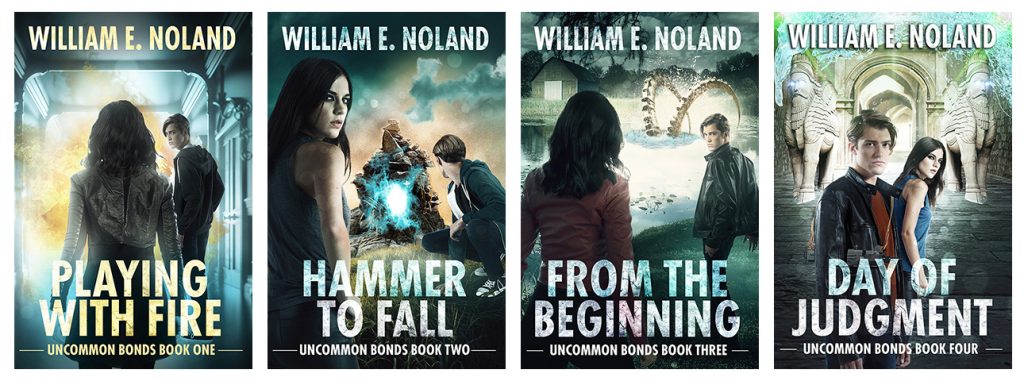



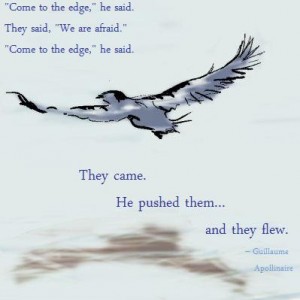
Please follow me here: